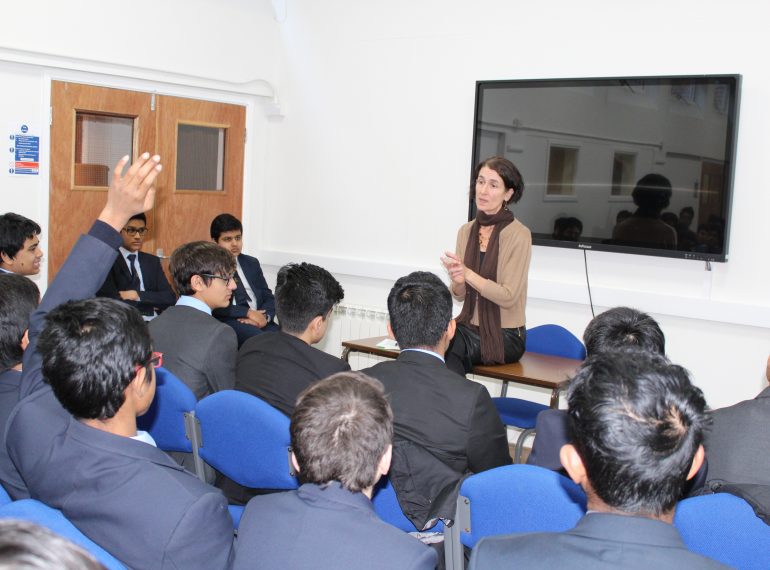British attitudes to equality and human rights – fair enough?

One of the UK’s leading human rights lawyers gave QE boys some thought-provoking insights into the complex area of British attitudes towards discrimination and the law.
Rebecca Hilsenrath, who is both Chief Executive and Chief Legal Officer to the Equality and Human Rights Commission, was a guest speaker at QE’s Politics Society. Her son, Adam Hilsenrath, (OE 2008–2015) is a former School Captain who won a place to read History at Oxford.
The commission, which is Great Britain’s national equality body, exists to “make Britain fairer…by safeguarding and enforcing the laws that protect people’s rights to fairness, dignity and respect”, according to its website.
Headmaster Neil Enright said: “I am most grateful to Rebecca for visiting us. The boys were clearly very engaged in the discussion that ensued and it is a great strength of the QE community that we can draw on people like her to come in and provide their knowledge, advice and inspiration to the boys. Her insights on the importance of voluntary work and of generally contributing to society accord fully with the tenets of our School mission.”
Ms Hilsenrath began her talk with a story of hill-climbing in Wales, where she thought she could see the top but realised that each time she got there, she had been deceived by the angle and there was in fact much further to go. A similar situation obtained with human rights in the UK, she said.
As the country of Magna Carta, Britain has “a fantastic tradition of leading on human rights and the development of law,” (which is why people in Brussels are so devastated at Brexit, she added.) The UK has done well in dealing with ‘direct discrimination’, but there are still many challenges around ‘indirect discrimination’. This results when groups are adversely affected by factors which, at face value, are not about them, but which particularly affect them. These groups often comprise those who do not enjoy high levels of public sympathy, such as gypsies or transgender people. Even with indirect discrimination, the picture is not altogether negative: there have been significant improvements for some groups as a result of cultural change, including much greater acceptance and equality.
The public, Ms Hilsenrath said, are generally supportive of single-issue matters of equality, but “people are scared of the big picture” and are negative on the advancement of human rights as a whole. There may, she believes, be some correlation between this and periods when Government finances are especially stretched: “People tend to be nastier to each other at these times, to hit out. Unhappiness can be manifested as xenophobia.”
The other important context is the continued prevalence of terrorism in the public and political discourse. The 9/11 attacks happened soon after the Human Rights Act came into full force in the UK. “Debate about human rights has been wrapped up in discussions of terrorism ever since,” she said. The public’s focus has often been on asking whether the country is being too lenient on terrorists, and there is a corresponding reluctance to grant terrorists rights: “It is much easier to give rights to those we like.”
Ms Hilsenrath argued, however, that it is possible both to have human rights and to implement robust measures to deal with terror, since many rights are “qualified” in relation to matters such as national security.
The Equality and Human Rights Commission’s last report two years ago showed big improvements for many, but made clear that there was still work to do. Some groups seemed to have fared worse than others as a result of policy and tax changes. She clarified the organisation’s mission: “We are not aiming for total equality – trying to make two people the same – instead we are after equality of opportunity.”
The boys asked a host of questions covering everything from her views on communism as a tool for trying to make society more equal and whether there should be a codified British Bill of Rights, to whether income inequality is necessarily a bad thing and whether some rights are more important than others.
She also provided some more general advice about working in law and public life, explaining that changing jobs can be a way to progress, as it helps you get a rounded experience.
She stressed the importance of voluntary work and encouraged boys to do as much of it as possible. Helping others was a key theme here: “Everybody needs to do what they can for other people out of love, to reach out and make a difference. Success in life is about being ‘the best you’, and to do that you need to do more than the day job.”
